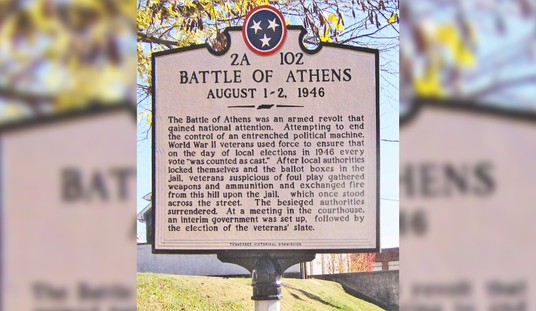There have been nine assassination attempts by extremists on Pakistan’s President Pervez Musharraf in seven years. One would think this would mean that anyone allied with Musharraf should feel threatened as well. Yet Maulana Fazlur Rahman, an Islamist political leader from the MMA party, who has been allied with Musharraf for most of the decade, has never faced an assassination attempt, not even death threats. When I asked one of my friends in Pakistan why this was, she laughed: “Target Mullah Diesel? Are you kidding?”
There were two assassination attempts on Benazir Bhutto in less than three months (the latest successful) during her run-up to the January elections. This would appear to suggest that Pakistan’s extremists are against the democratic push. Yet, Nawaz Sharif, head of another political party and former prime minister, has also not faced an assassination attempt or received death threats. In fact, the idea that an extremist might target Nawaz Sharif is laughable in most Pakistani circles: people sarcastically refer to him as “Amir ul Momineen,” the leader of the faithful. (While it was reported that a Nawaz Sharif rally was also attacked by gunfire today, the firing occurred after he departed, and it was not targeted by a suicide bomber.)
Why is it that Pakistan’s extremists (who purportedly hate Musharraf and democracy) are not consistent in targeting pro-Musharraf and pro-democracy people? Why do they pick and choose?
I think the answer is apparent: in Pakistan, if you do not criticize the Islamists, you will not be targeted. Musharraf and Bhutto did criticize the Islamists and that is why they tend to end up in the jihadi cross-hairs. Nawaz Sharif, on the other hand, has long pandered to Jamat e Islami (and in the early 90’s even Bin Laden), while Mullah Diesel heads the main pro-Taliban party. There is no reason for extremists to attack these people; they are already on the same side.
The fact is that Musharraf has choked Pakistan’s political process for nearly a decade now, which has contributed significantly to the expansion of extremism.
To top it all off, the U.S. has absolutely no leverage in Pakistan. The small amount of good will the U.S. had after 9/11 has dissipated and the incursion into Iraq didn’t help. Further, Musharraf was just recently removed as dictator in a bloodless coup. He is no longer head of the army, and as a civilian president he does not have the power to impose emergency. As it stands, there are only two options.
The first is a limited invasion of the sort recommended in a recent New York Times editorial by O’Hanlon and Kagan:
A second…option would involve supporting the core of the Pakistani armed forces as they sought to hold the country together in the face of an ineffective government, seceding border regions and Al Qaeda and Taliban assassination attempts against the leadership. This would require a sizable combat force – not only from the United States, but ideally also other Western powers and moderate Muslim nations.
The flaw in this plan, beyond its utter lack of feasibility, can be found in that last sentence: “a sizable combat force and an alliance with moderate Muslim nations.” The U.S. doesn’t have such a force, and there are no Muslim nations that would be willing to leave their own backs unguarded to bale out Pakistan.
The second, more realistic solution is for the U.S. to openly dump Musharraf and pull itself out of any semblance of involvement in Pakistan’s internal political affairs. The U.S. needs to be in a position where it has not been in a long time with Pakistan: objective.
As Mansoor Ijaz suggests at the National Review, the U.S. should call for Musharraf to set up an independent international investigation surrounding the killing of Ms. Bhutto.
An independent panel will likely conclude that it was the terrorists that killed Ms. Bhutto and not any elements associated with Musharraf himself. By doing so, Musharraf will be able to clear the cloud of suspicion hanging over his head, and might, in the process, be able to use the international community to identify how much the pro-Taliban elements have infiltrated Pakistan’s government. By severing itself from Musharraf and calling for an objective international panel, the US might also be able to see the extent of Musharraf’s complicity with the Islamists, if any.
In other words, Ms. Bhutto’s killing is a perfect opportunity for a long overdue audit of Pakistan, not merely so that the world can see who is killing innocent Pakistanis, but so that Pakistanis can see all the elements that have been involved in killing their leaders, neighbors, and families.
If the U.S. can create the conditions for such a public demonstration of the history and extent of jihadist killing and infiltration, it would arm the people of Pakistan with unerring proof about who is their real enemy. It would be a boost to their sense of survival. It would demonstrate that the US is looking out for them. They would be able to take these feelings to the polls.
Historically, Pakistanis have never voted for religious fanatics. Today the U.S. must use an international panel to remind them that the reason they have never voted Islamist is because Islamists do not care for Pakistani lives. This kind of gesture will give resolve to the people of Pakistan. When facing the kind of terrorism Pakistanis do every day, resolve is the most important thing.
Ali Eteraz is a writer and commentator.









Join the conversation as a VIP Member